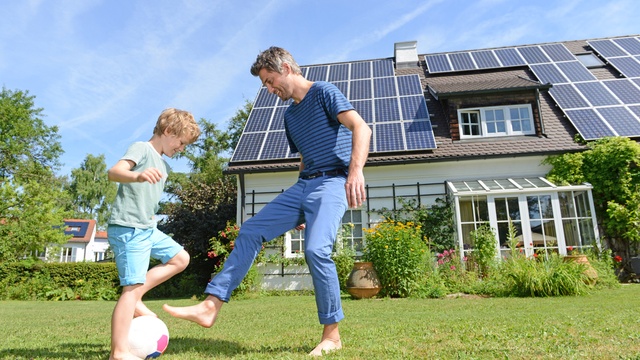People have been installing solar panels on their houses for over a decade but are they still a worthwhile investment?
Everyone understands the importance of renewable energy these days but how can you play your part? Installing solar panels on your home will let you generate your own electricity, and maybe even sell some back to the National Grid, but are they worth the cost of installation and maintenance?
How do solar panels work?
Every solar panel is made up of a number of cells. These cells capture light from the sun's rays and convert it into electricity. They work best in direct sunlight but they’ll still generate some electricity on cloudy days. The electricity generated is converted from DC to AC via an inverter.
If you generate more electricity than you use, you can sell the surplus electricity to an energy company, or store it in batteries to use later.
How many solar panels are needed to run a house?
This depends on the size of your property, the amount of electricity you use, and how much of your electricity you want to be generated by the solar panels. As a guide, a single-person household might need just four solar panels, whereas a family of four would need sixteen. If you want to work out how many you might need you can follow this calculation.
Planning permission isn’t required for solar panels (unless you live in a listed property or within a conservation area) but you do need to meet certain requirements.
How much do solar panels cost?
The cost of solar panels has decreased in the last decade. You could pay between £350 and £500 for one panel, so if you needed sixteen panels, you’d be paying between £5,600 and £8,000. Prices will vary depending on the brand of panel and the installers charge, so shop around to get different quotes.
Are there any government grants for solar panels in the UK?
There are no longer any grants available to help you with the cost of installing solar panels. You could speak to your bank as they often offer loans for home improvements, or the solar panel company would normally offer some kind of finance option.
Whilst there are no current grants available, you can get paid for selling surplus electricity via the Smart Export Guarantee (SEG). This scheme was introduced in January 2020 to replace the Feed-in Tariff (FIT). While it’s not as financially rewarding as the FIT scheme, the Smart Export Guarantee ensures that you get paid for any electricity that you generate and sell.
The amount you’ll be paid varies (and you won’t get rich doing this) but look for suppliers that’ll pay you around 5p/kWh. Bulb is currently offering 5.57p/kWh but you do need to be getting electricity from them too. They’ll pay 3p/kWh if you get electricity from another supplier.
If you sign up for SEG you’ll need a smart meter so that the amount of electricity you sell can be recorded.
Are solar panels worth it?
If you generate enough electricity to cover your needs, with some left over to sell, and you plan to stay in your house long term then yes, they could be worth it. And along with the possible financial benefit of course is the benefit to the planet through reducing your personal carbon footprint.
Use this online calculator to see whether solar panels would benefit you. If you need to borrow money to install your solar panels, remember to factor any interest into your calculations.
How long do solar panels last?
Solar panels last a long time, due to the fact they don’t have any moving parts. Panels are expected to last between 25 and 30 years, and maintenance costs are low. You can expect to pay around £100 for an annual service. They’ll need cleaning now and then, which you can do yourself or get a professional to do for you.
The inverter has a lifespan of around 10 years, and the cost to replace one of these varies between £500 and £1,500 depending on the size of your system.
Read on for 5 easy ways to save on your household bills.
Disclaimer: We make every effort to ensure content is correct when published. Information on this website doesn't constitute financial advice, and we aren't responsible for the content of any external sites.








